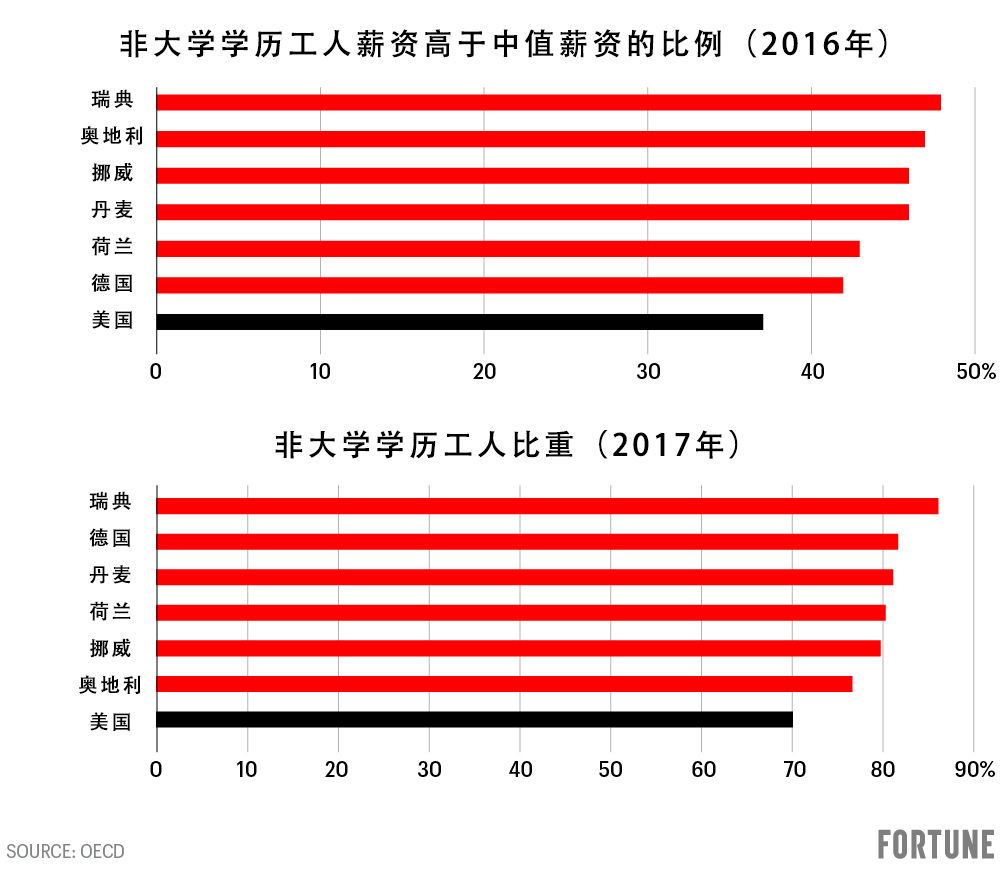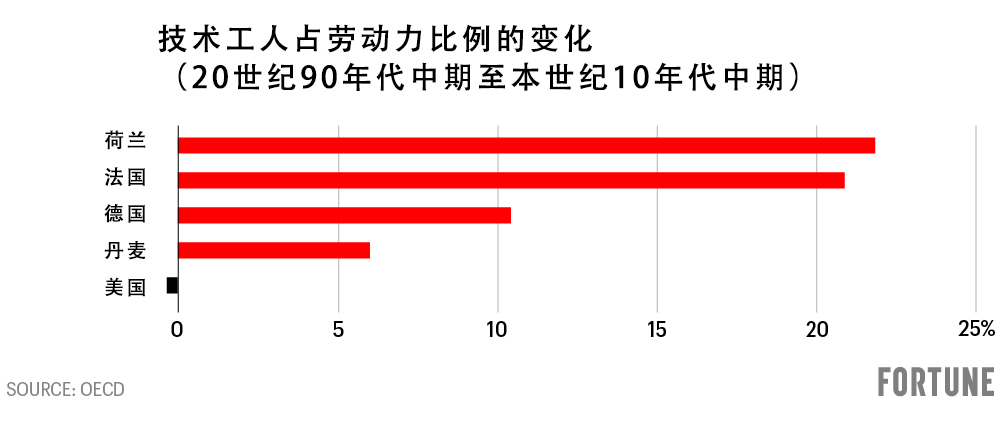
美國(guó)的大部分勞動(dòng)力都是高中畢業(yè),,沒(méi)有大學(xué)文憑。從財(cái)務(wù)上來(lái)講,,他們已經(jīng)落后了超過(guò)一代人:其實(shí)際薪資中值自1979年以來(lái)下跌了12.3%,,而持有大學(xué)文憑人士的薪資中值則增長(zhǎng)了14.4%??傮w來(lái)講,,如今只有不到三分之一的勞動(dòng)力在沒(méi)有大學(xué)文憑的情況下能夠拿到全美中值水平的薪資。
在美國(guó)總統(tǒng)的競(jìng)選中,,總統(tǒng)繼任者喬?拜登承諾通過(guò)出臺(tái)改變企業(yè)行為的政策,,為這一群體提供幫助。拜登公開(kāi)承認(rèn),,企業(yè)董事會(huì)對(duì)美國(guó)工人階層的困境負(fù)有責(zé)任,。至于拜登是否可以兌現(xiàn)這一承諾,則取決于他是否能夠有效地改善美國(guó)企業(yè)董事會(huì)對(duì)企業(yè)的治理,,也就是要求公司在董事會(huì)為工人設(shè)立相應(yīng)的席位,。
企業(yè)董事會(huì)與工資壓迫
自里根時(shí)代起,美國(guó)董事會(huì)的一項(xiàng)核心操作就是通過(guò)工資壓迫來(lái)實(shí)現(xiàn)股份價(jià)值的最大化,。這種股東資本主義的特征包括將公司內(nèi)部的勞資談判進(jìn)行外包或?qū)ζ溥M(jìn)行破壞(自幾十年前美墨聯(lián)營(yíng)工廠時(shí)期開(kāi)始),,并將高薪工作轉(zhuǎn)移給墨西哥和亞洲的低薪資制造商。
這一模式的替代模式就是利益相關(guān)者資本主義(stakeholder capitalism),。其中,,企業(yè)董事會(huì)會(huì)出臺(tái)有利于當(dāng)?shù)厣鐓^(qū)、雇員以及股東的政策,。拜登在今年7月的演講中表示贊成利益相關(guān)者資本主義,。然而,他對(duì)北歐富裕民主國(guó)家用于實(shí)現(xiàn)利益相關(guān)者資本主義的機(jī)制閉口不提,。經(jīng)濟(jì)學(xué)家將這一機(jī)制稱之為共同決定(Codetermination),。在共同決定機(jī)制中,管理層和工人會(huì)圍繞決策開(kāi)展合作,,尤其是通過(guò)工人代表進(jìn)駐董事會(huì)這種形式,。
少數(shù)黨領(lǐng)袖查爾斯?舒默和其他13名民主黨參議員對(duì)共同決定制表示了贊同,而且認(rèn)為理當(dāng)如此:在改善非大學(xué)學(xué)歷工人以及其他利益相關(guān)方經(jīng)濟(jì)狀況方面,,這已經(jīng)被證明是唯一行之有效的資本主義形式,。就像其在北歐發(fā)揮的作用那樣,拜登政府采用共同決定制的舉措可以把美國(guó)企業(yè)董事會(huì)從美國(guó)工人階層的捕食者轉(zhuǎn)變?yōu)橹С终摺?/p>
北歐工人階級(jí)的復(fù)興
之所以北歐國(guó)家(而非美國(guó))能夠打造高薪工作崗位,,并成功地讓非大學(xué)學(xué)歷男性和女性職員融入其國(guó)家經(jīng)濟(jì),,共同決定制功不可沒(méi),。經(jīng)合組織(OECD)稱,北歐這一群體工人的薪資相對(duì)于美國(guó)更加接近其全國(guó)的中值水平,。2017年,,這一群體在北歐國(guó)家的就業(yè)率達(dá)到了80%至85%,而同年美國(guó)的比例僅有70%,。

北歐富裕國(guó)家在過(guò)去半個(gè)世紀(jì)中實(shí)施了利益相關(guān)者資本主義,,并進(jìn)行了共同決定制的改革,要求公司董事會(huì)中要有較大比例的董事代表雇員和當(dāng)?shù)厣鐓^(qū)的利益,。例如在德國(guó)約2000家最大的公司中,,50%的董事都由雇員選出,而不是股東,。在這些大型公司中——包括像阿迪達(dá)斯,、拜耳、戴姆勒和意昂這樣家喻戶曉的公司,,有半數(shù)的董事都是雇員代表,。美國(guó)經(jīng)濟(jì)研究局(National Bureau of Economic Research)的多項(xiàng)分析亦證實(shí),共同決定制會(huì)造福雇員以及企業(yè)的投資和利潤(rùn),。
幾十年以來(lái),共同決定制一直都被證明是美國(guó)式工資壓迫的一個(gè)系統(tǒng)化,、市場(chǎng)化的補(bǔ)救措施,。世界大型企業(yè)聯(lián)合會(huì)(Conference Board)稱,這也是為什么德國(guó)及其北歐鄰國(guó)的薪資要高于美國(guó)的原因,。此外,,這一政策也導(dǎo)致北歐的很大一部分產(chǎn)出源于自身不帶有高薪工作崗位的技術(shù)工人。德國(guó)排名前30的企業(yè)(DAX 30的成員企業(yè))在德國(guó)銷(xiāo)售的產(chǎn)出僅占其全球的21%,,但其全球36%的勞動(dòng)力都集中在德國(guó),。例如,戴姆勒在德國(guó)的銷(xiāo)售額僅占其全球總額的15%,,但其全球超過(guò)一半的員工都在德國(guó),。大眾的這個(gè)比例僅有9%,但其全球40%的員工都在德國(guó),。
反向前進(jìn)的勞動(dòng)力
實(shí)施共同決定制的企業(yè)董事會(huì)專注于高生產(chǎn)力產(chǎn)品線,,它要求大幅提升公司內(nèi)部勞動(dòng)力的勞動(dòng)技能。因?yàn)楹商m(37%)等北歐各國(guó)受高等教育員工的比重要遠(yuǎn)低于技術(shù)工種的從業(yè)人員比重(53%),,因此各大企業(yè)會(huì)深入挖掘非大學(xué)學(xué)歷男性和女性員工,,并對(duì)其進(jìn)行技能升級(jí)培訓(xùn)。
經(jīng)合組織稱,,這一點(diǎn)與美國(guó)習(xí)慣性的企業(yè)工資壓迫舉措形成鮮明對(duì)比,,而該舉措導(dǎo)致了美國(guó)被視為“技術(shù)工種”的工作崗位數(shù)量在20世紀(jì)90年代中期到本世紀(jì)10年代中期出現(xiàn)了下滑,。然而,這類工作的比重在每一個(gè)北歐國(guó)家都出現(xiàn)了大幅增長(zhǎng),,其中,,荷蘭高達(dá)21.8%,法國(guó)高達(dá)20.8%,。早在2006年初,,北歐各國(guó)的這一比重均超過(guò)了美國(guó)(39%),其中挪威為48%,,德國(guó)44%,,荷蘭53%。盡管硅谷為美國(guó)提供了令人羨慕的優(yōu)勢(shì),,而且美國(guó)在全球信息產(chǎn)業(yè)占據(jù)著主導(dǎo)地位,,但這個(gè)轉(zhuǎn)型依然發(fā)生了。

更糟糕的是,,美國(guó)董事會(huì)對(duì)工人的降級(jí)是系統(tǒng)性的:就在技術(shù)工種工作數(shù)量出現(xiàn)下降的同時(shí),,美國(guó)這一期間所有被劃分為低技能工作崗位的數(shù)量增長(zhǎng)了3.3%。作為對(duì)比,,海外采用共同決定制的企業(yè)則在減少低薪資工作:例如,,荷蘭公司內(nèi)部低技能員工的比例下降了7.8%,法國(guó)下滑了6.4%,。
強(qiáng)化員工將帶來(lái)政治優(yōu)勢(shì)
除了經(jīng)濟(jì)方面的因素外,,拜登政府的共同決定動(dòng)議亦符合其在本國(guó)的政治考慮。首先,,該動(dòng)議回應(yīng)了民主黨擁躉的期許,,即民主黨會(huì)優(yōu)先實(shí)施那些可以造福經(jīng)濟(jì)落后群體的政策。除了提升最低薪資上限,、更加有力的勞資談判以及大學(xué)身債務(wù)減免之外,,共同決定制能夠賦予民主黨的核心支持者——年收入低于10萬(wàn)美元的人群、工會(huì)成員,、少數(shù)族裔和青年,,更多的機(jī)會(huì)。其中很多人都受到了新冠疫情的嚴(yán)重沖擊,。
第二,,共同決定制將成為一座橋梁,拉攏一部分重點(diǎn)關(guān)注經(jīng)濟(jì)而不是移民,、法律與秩序或多臺(tái)等社會(huì)問(wèn)題的特朗普支持者,。這部分人群當(dāng)然還包括諸多經(jīng)濟(jì)狀況較差的非大學(xué)學(xué)歷男性和女性職員,他們中的很大一部分在11月的美國(guó)總統(tǒng)大選中成為了特朗普的支持者,而且這部分人群的規(guī)模是可觀的,。獨(dú)立的投票后民調(diào)顯示,,經(jīng)濟(jì)是影響特朗普支持者最重要的因素,或僅次于反恐,??傮w來(lái)說(shuō),35%的選民將經(jīng)濟(jì)視作其支持某位候選人的首要考量因素,,在這些選民當(dāng)中,,83%選擇支持了特朗普。實(shí)施共同決定制之后帶來(lái)的一系列影響,,包括薪資的提升,、工作崗位海外轉(zhuǎn)移的終止以及更好的就業(yè),必將提升這些人的生活水平,。
拜登對(duì)美國(guó)工人階層以及擴(kuò)張民主黨承諾的真正考驗(yàn)將是其是否愿意支持共同決定制,。拜登支持用事實(shí)說(shuō)話的醫(yī)療科學(xué)。他也應(yīng)該運(yùn)用這一用事實(shí)說(shuō)話的經(jīng)濟(jì)學(xué),,來(lái)解決非大學(xué)學(xué)歷美國(guó)民眾所處的困境,。
共同決定制是改善工人階層經(jīng)濟(jì)狀況最有利的資本主義機(jī)制。它可以鞏固市場(chǎng)資本主義,。它也是唯一獲得證實(shí),,能夠提供更多機(jī)會(huì),減少經(jīng)濟(jì)不公平性的方式,,因?yàn)樗梢宰尫谴髮W(xué)學(xué)歷男性和女性職員融入美國(guó)主流經(jīng)濟(jì)當(dāng)中,。
總統(tǒng)繼任者拜登應(yīng)該把握這個(gè)機(jī)會(huì)。(財(cái)富中文網(wǎng))
喬治?泰勒此前曾經(jīng)擔(dān)任美國(guó)副助理財(cái)政部長(zhǎng)和世界銀行(World Bank)的官員,。他的書(shū)作包括《億萬(wàn)富翁民主》(Billionaire Democracy)和《出了什么問(wèn)題》(What Went Wrong),。
譯者:馮豐
審校:夏林
美國(guó)的大部分勞動(dòng)力都是高中畢業(yè),,沒(méi)有大學(xué)文憑,。從財(cái)務(wù)上來(lái)講,他們已經(jīng)落后了超過(guò)一代人:其實(shí)際薪資中值自1979年以來(lái)下跌了12.3%,,而持有大學(xué)文憑人士的薪資中值則增長(zhǎng)了14.4%,。總體來(lái)講,,如今只有不到三分之一的勞動(dòng)力在沒(méi)有大學(xué)文憑的情況下能夠拿到全美中值水平的薪資,。
在美國(guó)總統(tǒng)的競(jìng)選中,總統(tǒng)繼任者喬?拜登承諾通過(guò)出臺(tái)改變企業(yè)行為的政策,,為這一群體提供幫助,。拜登公開(kāi)承認(rèn),企業(yè)董事會(huì)對(duì)美國(guó)工人階層的困境負(fù)有責(zé)任。至于拜登是否可以兌現(xiàn)這一承諾,,則取決于他是否能夠有效地改善美國(guó)企業(yè)董事會(huì)對(duì)企業(yè)的治理,,也就是要求公司在董事會(huì)為工人設(shè)立相應(yīng)的席位。
企業(yè)董事會(huì)與工資壓迫
自里根時(shí)代起,,美國(guó)董事會(huì)的一項(xiàng)核心操作就是通過(guò)工資壓迫來(lái)實(shí)現(xiàn)股份價(jià)值的最大化,。這種股東資本主義的特征包括將公司內(nèi)部的勞資談判進(jìn)行外包或?qū)ζ溥M(jìn)行破壞(自幾十年前美墨聯(lián)營(yíng)工廠時(shí)期開(kāi)始),并將高薪工作轉(zhuǎn)移給墨西哥和亞洲的低薪資制造商,。
這一模式的替代模式就是利益相關(guān)者資本主義(stakeholder capitalism),。其中,企業(yè)董事會(huì)會(huì)出臺(tái)有利于當(dāng)?shù)厣鐓^(qū),、雇員以及股東的政策,。拜登在今年7月的演講中表示贊成利益相關(guān)者資本主義。然而,,他對(duì)北歐富裕民主國(guó)家用于實(shí)現(xiàn)利益相關(guān)者資本主義的機(jī)制閉口不提,。經(jīng)濟(jì)學(xué)家將這一機(jī)制稱之為共同決定(Codetermination)。在共同決定機(jī)制中,,管理層和工人會(huì)圍繞決策開(kāi)展合作,,尤其是通過(guò)工人代表進(jìn)駐董事會(huì)這種形式。
少數(shù)黨領(lǐng)袖查爾斯?舒默和其他13名民主黨參議員對(duì)共同決定制表示了贊同,,而且認(rèn)為理當(dāng)如此:在改善非大學(xué)學(xué)歷工人以及其他利益相關(guān)方經(jīng)濟(jì)狀況方面,,這已經(jīng)被證明是唯一行之有效的資本主義形式。就像其在北歐發(fā)揮的作用那樣,,拜登政府采用共同決定制的舉措可以把美國(guó)企業(yè)董事會(huì)從美國(guó)工人階層的捕食者轉(zhuǎn)變?yōu)橹С终摺?/p>
北歐工人階級(jí)的復(fù)興
之所以北歐國(guó)家(而非美國(guó))能夠打造高薪工作崗位,,并成功地讓非大學(xué)學(xué)歷男性和女性職員融入其國(guó)家經(jīng)濟(jì),共同決定制功不可沒(méi),。經(jīng)合組織(OECD)稱,,北歐這一群體工人的薪資相對(duì)于美國(guó)更加接近其全國(guó)的中值水平。2017年,,這一群體在北歐國(guó)家的就業(yè)率達(dá)到了80%至85%,,而同年美國(guó)的比例僅有70%。
北歐富裕國(guó)家在過(guò)去半個(gè)世紀(jì)中實(shí)施了利益相關(guān)者資本主義,,并進(jìn)行了共同決定制的改革,,要求公司董事會(huì)中要有較大比例的董事代表雇員和當(dāng)?shù)厣鐓^(qū)的利益。例如在德國(guó)約2000家最大的公司中,,50%的董事都由雇員選出,,而不是股東。在這些大型公司中——包括像阿迪達(dá)斯,、拜耳,、戴姆勒和意昂這樣家喻戶曉的公司,有半數(shù)的董事都是雇員代表。美國(guó)經(jīng)濟(jì)研究局(National Bureau of Economic Research)的多項(xiàng)分析亦證實(shí),,共同決定制會(huì)造福雇員以及企業(yè)的投資和利潤(rùn),。
幾十年以來(lái),共同決定制一直都被證明是美國(guó)式工資壓迫的一個(gè)系統(tǒng)化,、市場(chǎng)化的補(bǔ)救措施,。世界大型企業(yè)聯(lián)合會(huì)(Conference Board)稱,這也是為什么德國(guó)及其北歐鄰國(guó)的薪資要高于美國(guó)的原因,。此外,,這一政策也導(dǎo)致北歐的很大一部分產(chǎn)出源于自身不帶有高薪工作崗位的技術(shù)工人。德國(guó)排名前30的企業(yè)(DAX 30的成員企業(yè))在德國(guó)銷(xiāo)售的產(chǎn)出僅占其全球的21%,,但其全球36%的勞動(dòng)力都集中在德國(guó),。例如,戴姆勒在德國(guó)的銷(xiāo)售額僅占其全球總額的15%,,但其全球超過(guò)一半的員工都在德國(guó),。大眾的這個(gè)比例僅有9%,但其全球40%的員工都在德國(guó),。
反向前進(jìn)的勞動(dòng)力
實(shí)施共同決定制的企業(yè)董事會(huì)專注于高生產(chǎn)力產(chǎn)品線,,它要求大幅提升公司內(nèi)部勞動(dòng)力的勞動(dòng)技能。因?yàn)楹商m(37%)等北歐各國(guó)受高等教育員工的比重要遠(yuǎn)低于技術(shù)工種的從業(yè)人員比重(53%),,因此各大企業(yè)會(huì)深入挖掘非大學(xué)學(xué)歷男性和女性員工,,并對(duì)其進(jìn)行技能升級(jí)培訓(xùn)。
經(jīng)合組織稱,,這一點(diǎn)與美國(guó)習(xí)慣性的企業(yè)工資壓迫舉措形成鮮明對(duì)比,,而該舉措導(dǎo)致了美國(guó)被視為“技術(shù)工種”的工作崗位數(shù)量在20世紀(jì)90年代中期到本世紀(jì)10年代中期出現(xiàn)了下滑。然而,,這類工作的比重在每一個(gè)北歐國(guó)家都出現(xiàn)了大幅增長(zhǎng),,其中,荷蘭高達(dá)21.8%,,法國(guó)高達(dá)20.8%,。早在2006年初,北歐各國(guó)的這一比重均超過(guò)了美國(guó)(39%),,其中挪威為48%,,德國(guó)44%,,荷蘭53%,。盡管硅谷為美國(guó)提供了令人羨慕的優(yōu)勢(shì),而且美國(guó)在全球信息產(chǎn)業(yè)占據(jù)著主導(dǎo)地位,,但這個(gè)轉(zhuǎn)型依然發(fā)生了,。
更糟糕的是,美國(guó)董事會(huì)對(duì)工人的降級(jí)是系統(tǒng)性的:就在技術(shù)工種工作數(shù)量出現(xiàn)下降的同時(shí),美國(guó)這一期間所有被劃分為低技能工作崗位的數(shù)量增長(zhǎng)了3.3%,。作為對(duì)比,,海外采用共同決定制的企業(yè)則在減少低薪資工作:例如,荷蘭公司內(nèi)部低技能員工的比例下降了7.8%,,法國(guó)下滑了6.4%,。
強(qiáng)化員工將帶來(lái)政治優(yōu)勢(shì)
除了經(jīng)濟(jì)方面的因素外,拜登政府的共同決定動(dòng)議亦符合其在本國(guó)的政治考慮,。首先,,該動(dòng)議回應(yīng)了民主黨擁躉的期許,即民主黨會(huì)優(yōu)先實(shí)施那些可以造福經(jīng)濟(jì)落后群體的政策,。除了提升最低薪資上限,、更加有力的勞資談判以及大學(xué)身債務(wù)減免之外,共同決定制能夠賦予民主黨的核心支持者——年收入低于10萬(wàn)美元的人群,、工會(huì)成員,、少數(shù)族裔和青年,更多的機(jī)會(huì),。其中很多人都受到了新冠疫情的嚴(yán)重沖擊,。
第二,共同決定制將成為一座橋梁,,拉攏一部分重點(diǎn)關(guān)注經(jīng)濟(jì)而不是移民,、法律與秩序或多臺(tái)等社會(huì)問(wèn)題的特朗普支持者。這部分人群當(dāng)然還包括諸多經(jīng)濟(jì)狀況較差的非大學(xué)學(xué)歷男性和女性職員,,他們中的很大一部分在11月的美國(guó)總統(tǒng)大選中成為了特朗普的支持者,,而且這部分人群的規(guī)模是可觀的。獨(dú)立的投票后民調(diào)顯示,,經(jīng)濟(jì)是影響特朗普支持者最重要的因素,,或僅次于反恐??傮w來(lái)說(shuō),,35%的選民將經(jīng)濟(jì)視作其支持某位候選人的首要考量因素,在這些選民當(dāng)中,,83%選擇支持了特朗普,。實(shí)施共同決定制之后帶來(lái)的一系列影響,包括薪資的提升,、工作崗位海外轉(zhuǎn)移的終止以及更好的就業(yè),,必將提升這些人的生活水平。
拜登對(duì)美國(guó)工人階層以及擴(kuò)張民主黨承諾的真正考驗(yàn)將是其是否愿意支持共同決定制,。拜登支持用事實(shí)說(shuō)話的醫(yī)療科學(xué),。他也應(yīng)該運(yùn)用這一用事實(shí)說(shuō)話的經(jīng)濟(jì)學(xué),,來(lái)解決非大學(xué)學(xué)歷美國(guó)民眾所處的困境。
共同決定制是改善工人階層經(jīng)濟(jì)狀況最有利的資本主義機(jī)制,。它可以鞏固市場(chǎng)資本主義,。它也是唯一獲得證實(shí),能夠提供更多機(jī)會(huì),,減少經(jīng)濟(jì)不公平性的方式,,因?yàn)樗梢宰尫谴髮W(xué)學(xué)歷男性和女性職員融入美國(guó)主流經(jīng)濟(jì)當(dāng)中。
總統(tǒng)繼任者拜登應(yīng)該把握這個(gè)機(jī)會(huì),。(財(cái)富中文網(wǎng))
喬治?泰勒此前曾經(jīng)擔(dān)任美國(guó)副助理財(cái)政部長(zhǎng)和世界銀行(World Bank)的官員,。他的書(shū)作包括《億萬(wàn)富翁民主》(Billionaire Democracy)和《出了什么問(wèn)題》(What Went Wrong)。
譯者:馮豐
審校:夏林
A majority of the American labor force are high school graduates without college degrees. They have been falling behind economically for well more than a generation: Their median real wage has dropped 12.3% since 1979, while the median wage of those holding college degrees has increased 14.4%. Overall, barely one-third of those without college educations now earn the national median wage.
During the presidential campaign, President-elect Biden promised relief to this demographic group with policies to change corporate behavior. Biden is spot-on in acknowledging that corporate boardrooms are accountable for America’s working-class plight. His success in fulfilling that promise hinges on how effectively he upgrades boards' governance of U.S. corporations—by requiring them to give workers a seat at the table.
Corporate boards and wage suppression
A central practice of U.S. boards of directors since the Reagan era has been wage suppression to maximize share value. Characteristics of this shareholder capitalism include outsourcing and kneecapping collective bargaining at home while (since the maquiladora era decades ago) offshoring well-paying jobs to low-wage producers in Mexico and Asia.
The alternative to this model is stakeholder capitalism, where corporate boards pursue policies that benefit local communities and employees in addition to shareholders. Biden embraced stakeholder capitalism in a speech in July. But he was silent on the mechanism utilized by rich democracies of Northern Europe to effectuate stakeholder capitalism—a mechanism that economists call codetermination. In codetermination, management and workers cooperate in decision-making, especially through the representation of workers on boards of directors.
Minority Leader Charles Schumer and 13 other Senate Democrats have endorsed codetermination, and rightly so: It is the only version of capitalism proven effective in improving the economics of non-college workers along with other stakeholders. Just as it has in Northern Europe, a Biden administration embrace of codetermination can transform U.S. corporate boards from predators to advocates for working-class Americans.
Northern Europe’s working-class renaissance
Codetermination is why Northern European nations have succeeded where the U.S. has failed in creating high-wage jobs that successfully integrate non-college-educated men and women into their national economies. According to the OECD, the pay of workers in this demographic in Northern Europe is closer than that of their U.S. counterparts to national medians, and 80% to 85% of them were employed in 2017, compared to just 70% of American non-college workers that same year.
The rich democracies of Northern Europe over the last half-century have implemented stakeholder capitalism with codetermination reforms, requiring that a hefty portion of corporate directors represent the interests of employees and local communities. In Germany, for example, 50% of directors on the boards of the largest 2,000 or so firms are elected by employees, not shareholders. At these powerful firms, which include familiar names like Adidas, Bayer, Daimler and EON, half the board members are employee representatives. Multiple analyses, including by the National Bureau of Economic Research, have affirmed that codetermination advantages workers as well as enterprise investment and bottom lines.
Codetermination has proven over many decades to be a systemic, market-based remedy to U.S.-style wage suppression. It is why wages in Germany and its neighbors across Northern Europe are higher than U.S. wages, according to the Conference Board. Moreover, their policies have resulted in a disproportionate share of output across Northern Europe being produced by high-skill industries husbanding high-wage jobs at home. The 30 largest German corporations (members of the DAX 30) sell only 21% of their global output in Germany itself, but 36% of their global workforce is there. Only 15% of Daimler sales are German, for example, but more than half of its global workforce is there. And Volkswagen sells only 9% of its output in Germany, while 40% of its global workforce is there.
Workforces moving in opposite directions
The focus of codetermination-staffed corporate boards on high-productivity product lines has required the aggressive upskilling of domestic workforces. Because the share of college-educated workforces across Northern Europe in nations like the Netherlands (37%) is far smaller than the proportion of people employed in skilled job sectors (53%), corporations reach deep into the ranks of non-college-educated men and women for workers to upgrade.
This stands in sharp contrast with the U.S. Habitual corporate wage suppression caused the share of jobs considered “skilled” to decline in the U.S. between the mid-1990s and mid-2010s, according to the OECD. Yet the share of such jobs rose sharply in every Northern European economy, including a huge 21.8-percentage-point jump in the Netherlands and a 20.8-point leap in France. By as early as 2006, that share across all of Northern Europe, including Norway (48%), Germany (44%), and the Netherlands (53%), had surpassed the U.S. share (39%). That transformation occurred despite the enviable edge provided by Silicon Valley and the dominant U.S. role in global information technology.
Worse, the downgrading of U.S. workers by corporate boards is systemic: While the share of high-skill jobs dropped, the share of all U.S. jobs classified as low-skill increased 3.3 percentage points during this span. In contrast, codetermination corporations abroad shed low-wage jobs: The low-skill share of domestic workforces declined 7.8 percentage points in the Netherlands, for instance, and 6.4 percentage points in France.
Strengthening workers is good politics
Aside from economics, there are domestic political considerations warranting a Biden codetermination initiative. First, it responds to expectations from the Democratic Party’s most ardent supporters that the party will prioritize policies benefitting those who are economically lagging. Along with higher minimum wages, stronger collective bargaining, and college debt forgiveness, codetermination can enhance opportunity for those earning less than $100,000, union members, minorities, and youths—the party’s core, many of whom are being battered by the pandemic.
Second, codetermination is a bridge to that segment of Trump voters primarily concerned with economics rather than immigration, law and order, or social issues like abortion. That segment certainly includes numerous economically stressed non-college-educated men and women, a demographic overrepresented in U.S. counties that supported Trump in November. And it is sizable. Separate exit polling found that economics was either the most important issue influencing Trump voters, or second to fighting terrorism. Overall, 35% of voters named the economy as their top reason for selecting a candidate, and 83% of those voters voted for Trump. The characteristics that accompany codetermination—higher wages, ending job offshoring, and stronger employment—will certainly enhance their lives.
The true test of Biden’s commitments to America’s working class and expanding the Democratic Party will be his willingness to back codetermination. Biden lauds evidence-based medical science. He should apply evidence-based economics to the plight of non-college-educated Americans.
Codetermination stands alone as the most powerful mechanism of capitalism for improving working-class economics. It strengthens market capitalism. And it is the only option proven to expand opportunity and reduce economic inequality by reintegrating non-college-educated men and women into America’s economic mainstream.
President-elect Biden should seize the moment.
George Tyler is a former deputy assistant treasury secretary and World Bank official. He is the author of books including Billionaire Democracy and What Went Wrong.






